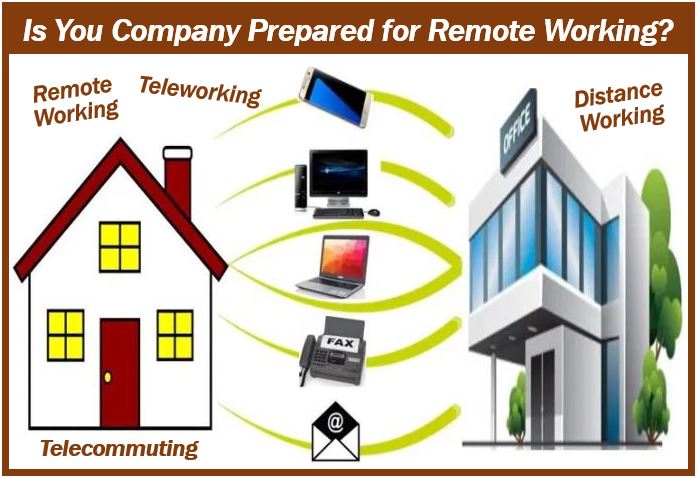On the evening of March 23, the Prime Minister, Boris Johnson, announced that all “non-essential” businesses must close, effective immediately. Those providing medical services and food supplies will remain open, albeit operating under strict measures to reduce the risk of spreading COVID-19.
How can owners of “essential businesses” keep their employees and customers safe? If you’ve had to close the doors on your workplace, how can you help people to keep working and minimise the long-term impact of the pandemic?

This national crisis is rapidly evolving by the day and it is impossible to predict the future for businesses. However, there are some simple steps companies and organisations can take to put themselves in the best position to pick themselves up and move on after government restrictions ease.
What Is Coronavirus?
Coronaviruses are a group of viruses that cause disease in animals. Some of these viruses have spread to humans.
Scientists believe the virus is spread by cough droplets passed from person to person, hence the call for strict “social distancing”. The main symptoms include a high fever and a persistent dry cough. The death rate varies between 0.7 and 3.4 per cent, with the most vulnerable being the elderly or those with underlying health conditions.
The source of the current Covid-19 outbreak is believed to be an individual in Wuhan “wet market” in China last December. The virus has since spread globally, with figures pushing towards 2 million infections as of April 2020.
Why Do “Non-essential” Businesses Have to Close?
Due to the nature of infection — cough droplets passed from an infected person to another individual — close contact between people allows the virus to spread.
The primary line of defence against the pandemic is effective social distancing. This means preventing people from coming into close contact with those outside their home. Closing “non-essential” businesses allows the government to control how much interaction people have with one another and thereby reduces the risk of spreading the virus.
How Can I Protect My Business?
Owners of businesses that remain open to provide essential services and supplies, such as sanitizing stands, must ensure they are fulfilling their legal duty to protect the health, safety and welfare of their employees and customers.
In addition to any safety measures already in place to safeguard people on-site from harm, employers must assess the risk that the coronavirus has to people in their particular workplace and implement strategies for mitigating that risk. For example, some food shops have restricted the number of customers allowed on the premises at any one time to reduce the risk of shoppers breaking the 2-metre rule due to crowding.
For “essential” and “non-essential” businesses, planning for the future is vital. This planning will mark the difference between those who weather the storm and those destroyed by the current crisis.
Remote Working
With lockdowns in full force across the globe, remote-working tools have become an essential part of the business for millions of companies.
Employers can help to keep people in work and reduce the risk of lost productivity by doing all that is possible to implement an efficient and effective system for remote workers.

Allow staff to borrow key equipment such as laptops and headsets, enabling them to continue working from home. Keep the lines of communication open by ensuring satellite workers have a key point of contact for advice and support. Take advantage of collaboration systems such as Slack, software that allows remote workers to converse in client-specific groups, ensuring that projects remain on track and work is not duplicated. Schedule regular team “meetings” via online conference call services such as Skype or Zoom.
Besides communication platforms, other software is available to help support operations during social-distancing measures. Cloud-based systems can provide industry-specific solutions to aid your business. As a few broad examples, remote access to accountancy tools, supply-chain sourcing platforms, and claims management systems (as referenced below) can ensure remote work practices don’t compromise your ability to function. Whatever is important to your industry, there is likely an online tool available to help.
The availability of such tools has been facilitated by the fact that many companies have been operating entirely remotely for years, and this enforced period of global homeworking could mark a permanent shift towards a new working culture. Use this time to streamline remote working processes to keep your business running efficiently both now and in the future.
Seek out Government Support for Businesses
The Chancellor, Rishi Sunak, recently announced a major package of financial support for businesses in the UK to help them survive the Covid-19 crisis.
These “temporary, timely and targeted” measures include deferring VAT and tax payments, statutory sick pay relief, a 12-month business rates holiday and various business grants. Review the full details on the government website.
The current “lock-down” will cut off all income for many SMEs. Keep up-to-date with the government support available and take advantage of all that is necessary to keep your business going and your employees supported during the coming months.
Implement an Effective Claims Management System
All businesses should ensure they have a robust system for managing employee compensation claims. If an employee sustains a work-related illness, they may be entitled to submit a claim for compensation.
Claims management software can handle all internal claims from employees. An effective claims system should protect a business against unnecessary expense while ensuring employees are treated fairly. Advanced, feature-rich software will streamline the claims process and reduce the number of staff required to handle a claim by automating key tasks.
Coronavirus can impact any worker in any environment. Employers who have previously put off the task of implementing appropriate claims handling processes due to the apparently “low risk” nature of their business should act now.
In this rapidly changing environment, many businesses will be struggling to stay afloat and look after their employees. First and foremost, ensure you are fulfilling your legal duty of care to protect the wellbeing of employees, customers and anyone else who may come into contact with the business. Avail yourself of any government support. Finally, use this time to plan for the future success of your business and implement systems to help get things back on track once government restrictions ease.
___________________________________________________
Interesting related article: “What is the coronavirus?”

